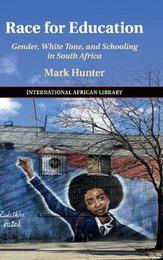
|
Race for Education: Gender, White Tone, and Schooling in South Africa
Hardback
Main Details
| Title |
Race for Education: Gender, White Tone, and Schooling in South Africa
|
| Authors and Contributors |
By (author) Mark Hunter
|
| Series | The International African Library |
|---|
| Physical Properties |
| Format:Hardback | | Pages:320 | | Dimensions(mm): Height 235,Width 156 |
|
| Category/Genre | African history |
|---|
| ISBN/Barcode |
9781108480529
|
| Classifications | Dewey:379.260968 |
|---|
| Audience | | Tertiary Education (US: College) | | Professional & Vocational | |
|---|
| Illustrations |
Worked examples or Exercises
|
|
Publishing Details |
| Publisher |
Cambridge University Press
|
| Imprint |
Cambridge University Press
|
| Publication Date |
24 January 2019 |
| Publication Country |
United Kingdom
|
Description
Following the end of apartheid in 1994, the ANC government placed education at the centre of its plans to build a nonracial and more equitable society. Yet, by the 2010s a wave of student protests voiced demands for decolonised and affordable education. By following families and schools in Durban for nearly a decade, Mark Hunter sheds new light on South Africa's political transition and the global phenomenon of education marketisation. He rejects simple descriptions of the country's move from 'race to class apartheid' and reveals how 'white' phenotypic traits like skin colour retain value in the schooling system even as the multiracial middle class embraces prestigious linguistic and embodied practices the book calls 'white tone'. By illuminating the actions and choices of both white and black parents, Hunter provides a unique view on race, class and gender in a country emerging from a notorious system of institutionalised racism.
Author Biography
Mark Hunter is Associate Professor of Human Geography at the University of Toronto. His research methods combine ethnographic, historical, and geographical techniques and his first book, Love in the Time of AIDS: Inequality, Gender, and Rights in South Africa (2010), won the 2010 Amaury Talbot Prize and the 2010 C. Wright Mills Award.
Reviews'Mark Hunter has produced the definitive text on the sociology of urban education in South Africa ... the book offers a novel account of how post-apartheid educational reforms have not led to the 'de-whitening' of the grammar of privilege ... to understandings of schooling and youth identity in globalised cities.' Aslam Fataar, Universiteit Stellenbosch, South Africa and former President of the South African Education Research Association 'Hunter takes an issue at the centre of contemporary politics - schooling - and, through extensive ethnographic and archival research, elucidates the many inequalities at work while providing a deeply humanising portrait of those who face some of the greatest structural obstacles. This book sets a new standard for analysing the interplay of race and class in South Africa, one that is subtly attuned to gendered dynamics and linguistic formations.' Lynn M. Thomas, University of Washington '[Hunter's] research challenges the common-sense view that desegregated schools would be the lynchpin of deracialisation. This is a fine and original study of the remaking of race with implications well beyond South Africa's borders.' Shireen Hassim, University of the Witwatersrand, Johannesburg 'Mark Hunter has written another outstanding and hugely insightful book. This book establishes a new reading of South Africa's society and urban spaces, looking in detail at the case of Durban. He brings a sophisticated spatial perspective to understand new forms of racialisation of the prospects of South Africa's children, and of the profound inequalities created by education.' Jennifer Robinson, University College London 'This is a subtle, thoughtful, carefully argued book about the foundations of the enduring power of 'white tone' in post-apartheid South Africa.' Jonny Steinberg, University of Oxford '... the most important study of race and class written in a long time, one that could be read with great profit even by those who know little about South Africa.' Bill Freund, Social History 'The book adds to our growing understanding of the ways in which South Africa's 'transition' occurred in diverse ways in multiple institutional sites and spaces ... an important contribution to urgent debates over the place of schooling in (re)making race and inequality.' Rachel E. Johnson, English Historical Review '... the book combines rigorous historical research, forays into isiZulu linguistics and detailed ethnography. This makes for a readable book that provokes critical questions about the meanings of race, class formation and the value of education in unequal societies.' Christopher Webb, Journal of Southern African Studies 'Race for Education is a welcome addition to the literature on the history and politics of schooling and inequality in South Africa ... the depth and breadth of the research and the window it provides into different worlds of schooling in the first two decades after apartheid-make this book essential reading for anyone looking for a deeper understanding of contemporary South African social dynamics.' Linda Chisholm, American Historical Review
|